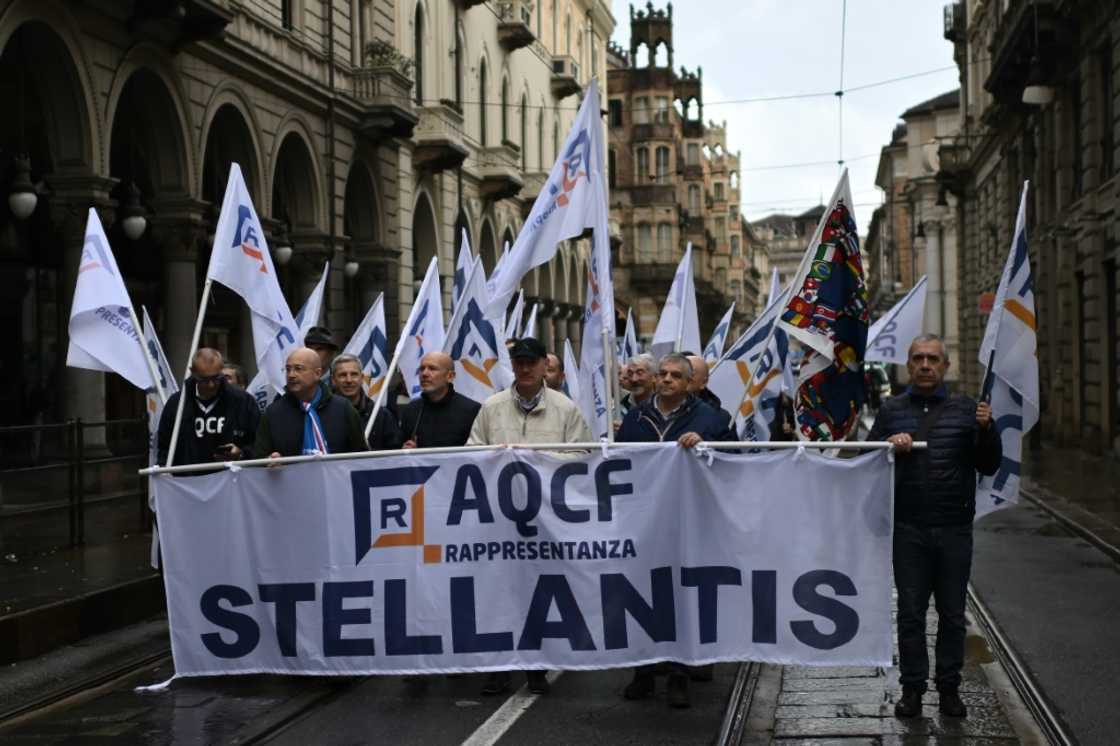Stellantis workers march in Italy over production slump

Source: AFP
CHECK OUT: Education is Your Right! Don’t Let Social Norms Hold You Back. Learn Online with LEGIT. Enroll Now!
Thousands of Stellantis workers went on strike Friday and protested in Rome over temporary layoffs and production stoppages by the maker of Fiat and Jeep in Italy.
Unions called the group's 40,000 employees in Italy and workers at its suppliers to observe a 24-hour national strike to demand job guarantees and the production of new models.
Some 15,000 demonstrators were expected for "a historic strike like there has not been for more than 40 years" in the factories of the former national flagship Fiat, union organisers said.
The Italian carmaker merged in 2014 with US giant Chrysler, then with France's Peugeot-Citroen (PSA) in 2021, to become the Stellantis group, with more than a dozen brands that include Alfa Romeo, Dodge and Maserati.
After three years of growth, market conditions are now tough, including low demand for costly electric vehicles.
Production in Italy fell by 31.7 percent to 387,600 vehicles in the first nine months of 2024, according to metallurgy union FIM-CISL, which said it was "the worst figure since 1956".
PAY ATTENTION: Legit.ng Needs Your Help! Take our Survey Now and See Improvements at LEGIT.NG Tomorrow
It expects the company to produce "fewer than 500,000 vehicles" this year, compared to over 751,000 in 2023.
Production stoppages and temporary lay-offs have created tensions between the company and Rome.
Under increasingly political pressure, Stellantis boss Carlos Tavares committed in July 2023 to increasing production to one million units by 2030.
That goal now seems unattainable.
Sales of electric vehicles in Europe have been stagnating since the end of 2023, mainly due to a lack of affordable models.
Stellantis also blames a delay in the Italian government's launch of incentives for buying electric cars.
Meanwhile, Brussels has banned sales of new combustion-engine cars by 2035, as part of efforts to rein in man-made climate change.
Two days before the strike, Stellantis said several of its Italian factories would stop production again in November to regulate production, citing "the drop in orders in the electric vehicle market in Europe".
Production of the electric version of the iconic Fiat 500 at the Mirafiori plant, near Turin, was suspended in mid-September until November 1.
Stellantis has also announced stoppages at the Pomigliano d'Arco, Termoli and Pratola Serra factories on several days in November.
Mirafiori, the stage for Fiat's golden age, "is slowly dying", Maurizio Oreggia, national automotive coordinator for the Fiom-Cgil union, told AFP.
Workers have been forced into temporary layoffs, a scheme which allows companies in crisis to stand down staff for a limited period on a reduced pay.
"Time's up," said Rocco Palombella, head of the UILM union.
"The automobile industry is dying, we risk an unprecedented social tragedy," he said.
PAY ATTENTION: Сheck out news that is picked exactly for YOU ➡️ find the “Recommended for you” block on the home page and enjoy!
Source: AFP


